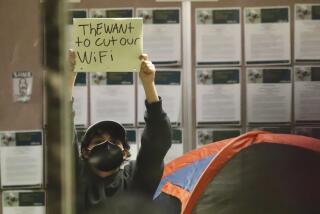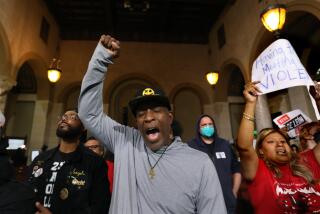Arafat Tells Council of Critical Situation for Palestinians
- Share via
RAMALLAH, West Bank — The Palestinian Legislative Council met in the West Bank for the first time Wednesday to discuss what many members consider to be the worst crisis in the 2 1/2-year-old Israeli-Palestinian peace process.
Palestinian leader Yasser Arafat opened the session with a speech of more than two hours outlining the “critical” political and economic situation in the self-rule area that has been sealed off by Israel since a series of suicide bombings by Islamic militants began Feb. 25.
Faced with mounting criticism over a police raid at An Najah University in Nablus last weekend, Arafat reportedly acknowledged to the legislators that the Palestinian police had erred in entering the campus to break up a student protest against the arrest of suspected activists of the militant group Hamas.
As Arafat spoke, about 2,000 Palestinian university students pushed through police lines to reach the nearby Palestinian-run Ramallah jail for another protest against the detention of hundreds of Hamas suspects by Palestinian and Israeli police.
Police scuffled with the students and fired shots in the air, but no injuries were reported. Arafat left the council session to speak to the demonstrators, but when faced with the angry crowd, he opted to meet privately with a group of about 30 of the students.
The council meeting--the third since the body was elected in January--was heavy on security but light on public disclosure. Arafat insisted on delivering his speech behind closed doors and kicked the media out of the morning session. Some legislators objected to the secrecy, but the afternoon session remained closed.
The council gathered in Ramallah, about 10 miles north of Jerusalem, as Israel went on high alert for the Jewish holiday of Passover after Hamas threatened further suicide attacks.
A Palestinian official told Reuters news agency that Palestinian police in the Gaza Strip arrested three Islamic militants who had four suitcases of explosives and were planning to carry out suicide bombings in Israel.
Legislative Council members, meanwhile, criticized Israel’s sealing off of the West Bank and Gaza Strip, which prevents about 60,000 Palestinians from going to their jobs in Israel, and its failure to redeploy Israeli troops from the West Bank city of Hebron last month as called for in the peace agreements.
They charged that Israeli Prime Minister Shimon Peres violated the peace accords by promising to hold a referendum on a final peace agreement and that he is holding Palestinians hostage to the May 29 Israeli elections.
“Israel is reneging,” said council member Hanan Mikhail-Ashrawi. “The feeling is that the closure is leading not only Palestinians but the whole peace process to a crisis.”
During a trip to the Persian Gulf states of Oman and Qatar this week, the campaigning Peres told Israeli reporters that he would hold a referendum on a final agreement that is to resolve the issues of Jerusalem, West Bank settlements and the size and status of the Palestinian-rule area.
“We head toward the elections by keeping to parameters: the Jordan [River] as a security border, the non-division of Jerusalem and the non-withdrawal of settlements. This will be our position in the negotiations. There is no need to take down settlements,” Peres said.
The Palestinian position is that Israeli troops and the more than 120,000 settlers should leave the West Bank and Gaza Strip, which Israel captured in the 1967 Mideast War. The Palestinians want to establish an independent state there with East Jerusalem as its capital.
“Peres has adopted the program of the right wing in Israel,” said council member Yasser Abed-Rabbo. “If his declaration on the settlements is true, there is no agreement between Israel and us.”
In the council meeting, legislators reportedly took issue with the fact that Palestinian police had raided An Najah University. The universities are generally regarded as off limits to security forces, and it is widely believed that Palestinian police would not move into one without an order from Arafat.
Council member Ziad abu Amr said Arafat acknowledged the error. “The president indicated that the Palestinian Authority can make a mistake, that even he can make a mistake.”
But Abu Amr described the debate as limited in the presence of Arafat, who as president of the Palestinian Authority has a seat on the council in addition to its 88 members.
More to Read
Sign up for Essential California
The most important California stories and recommendations in your inbox every morning.
You may occasionally receive promotional content from the Los Angeles Times.










